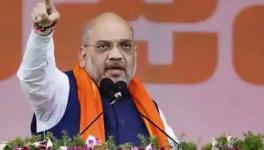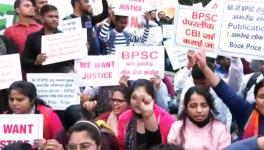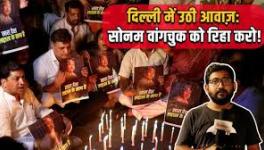The Great Bihar Bargain: Why 2025 is a Post-Ideological Battle for Power
Representational Image. File Image
The 2025 Bihar Assembly election exemplifies the dominance of a post-ideological era in state politics, where pragmatic opportunism and the quest for power have largely eclipsed coherent political beliefs. This transactional method, while not new to Indian politics and previously visible in state and national elections, has been honed and scaled dramatically in the Narendra Modi- Amit Shah era.
The ruling Bharatiya Janata Party (BJP), with its vast resources and relentless focus on winning at all costs, has perfected this approach. This contest is, therefore, not a "battle of ideas" but a raw calculation of arithmetic and ambition. While the familiar slogans echo, the actual political maneuvering reveals a system driven by transactional deal-making, where loyalty is flexible and ideology is often just window dressing. Welcome to the Great Bihar Bargain, where securing the best deal is the ultimate political goal.
This transactional reality permeates every level of the political structure, fundamentally altering the nature of representation and democracy in contemporary Bihar. At the highest level, the major alliances themselves betray this post-ideological reality. These are not cohesive blocs united by shared principles but fragile "coalitions of convenience," engineered solely to maximise caste arithmetic and consolidate vote banks.
The ruling National Democratic Alliance (NDA) yokes together BJP, with its nationalistic Hindutva platform, and Nitish Kumar's Janata Dal (United), a party ostensibly rooted in socialist traditions. Their long, often turbulent partnership, punctuated by Nitish Kumar's strategic exits and re-entries, highlights the purely pragmatic nature of their bond.
The 2025 seat-sharing arrangement, where BJP finally asserted its dominance by enforcing seat parity (101 each), was naked power play, not an ideological reconciliation.
The JD(U) list, for instance, has actively fielded leaders who just defected from the Opposition Rashtriya Janata Dal (RJD). The inclusion of Chetan Anand (son of Anand Mohan) from Nabinagar and Vibha Devi (wife of Rajballabh Yadav) from Nawada are perfect examples. Both were with RJD until recently. Also, the inclusion of junior partners further underscores the strategy: bolting on specific caste vote percentages to achieve a winning numerical formula, irrespective of internal contradictions or past betrayals.
This pragmatic erosion of belief, however, is not exclusive to new parties; established players have perfected it. As senior journalist Soroor Ahmad highlights, the current political alignment in Bihar serves as a powerful case study. He notes that for decades, the BJP, including its leaders like late Sushil Modi, built its core political identity on a relentless campaign against the perceived "Jungle Raj" of the Lalu Prasad era. Yet today, individuals once prominent in that very ecosystem--such as Sadhu Yadav along with Samrat Chaudhry, Ram Kripal Yadav and Shyam Rajak -- have been pragmatically absorbed into NDA.
The elevation of Samrat Choudhary to Deputy Chief Minister, and his position as BJP's most prominent face in the state, is perhaps the most striking example. His political journey illustrates this transactionalism: he was a minister in RJD's Rabri Devi government in 1999, stayed with RJD until 2014, defected to JD(U), and finally joined BJP around 2018, becoming state president in 2023.
The fact that a politician who is not a "homegrown" ideological figure, but rather a relatively recent convert, has become a key proponent of RSS and BJP ideology strengthens this post-ideological argument. This reveals a political consensus where, as Ahmad puts it, "ideology can go to hell" so long as the "pragmatic" goal of winning the election is achieved.
The hollowness of any claim to ideological battle was starkly exposed by a recent incident in Tarapur. On October 20, Sakaldeo Bind, reported as the VIP (Vikassheel Insaan Party) candidate, defected to BJP and publicly endorsed his direct opponent, Deputy CM Samrat Chaudhary.
A day later, the narrative became even more muddled as VIP chief Mukesh Sahani dismissed Bind as an independent, not an official party candidate. This confusion, coupled with the sheer ease of a candidate backing his primary rival, highlights a political landscape where ideology appears to be a mere flag of convenience, easily discarded for personal or tactical advantage.
The Opposition Mahagathbandhan also finds itself deeply enmeshed in this transactional logic, forcing RJD, Congress, various Left parties, and now Mukesh Sahani's VIP into an uneasy embrace. While their stated aim is to provide an ideological alternative to NDA, their internal deal-making reveals similar pragmatic calculations. Their unity stems less from a fully shared vision and more from the singular, pragmatic imperative to pool anti-NDA votes—a task complicated by internal clashes and unresolved seat allocations even as nominations closed, exposing the transactional haggling beneath the veneer of alliance unity.
The RJD has equally demonstrated that electoral opportunism trumps ideological loyalty, readily welcoming high-profile defectors from rival parties. The party awarded the Belhar ticket to Chanakya Prakash Ranjan, the son of a sitting JD(U) MP, and gave the Parbatta seat to its sitting JD(U) MLA, Sanjeev Kumar, immediately after he switched sides.
Similarly, former JD(U) leader Santosh Kushwaha was controversially fielded from Dhamdaha, sparking protests from RJD's own cadres. Most notably, in the high-stakes Mokama constituency, the RJD inducted Veena Devi-wife of strongman Surajbhan Singh and a defector from the RLJP-to directly challenge Anant Singh, the very man who had previously won the same seat on an RJD ticket.
Prashant Kishor of Jan Suraaj has explicitly positioned his platform as "anti-ideological." Arguing that "pragmatism is more important than ideology" and that most historical cruelties were committed in ideology's name, his movement focuses instead on technocratic solutions, governance, and finding the "right people." However, this platform faces a fundamental contradiction between its stated ideal of "good" and "socio-politically clean" candidates and its actual candidate selection.
Kishor's public narrative emphasises a clean, technocratic alternative, yet this is directly undermined by pragmatic compromises. A key example is the fielding of Sarfaraz Alam from Jokihat, a "party hopper" whose father, Taslimuddin, had multiple criminal charges listed in his 2020 affidavit. This selection exposes a significant gap between rhetoric and reality.
Furthermore, candidates like Manish Kashyap, with a history of misogynistic and Islamophobic remarks, and Pratibha Singh, who resigned from Congress shortly before joining, highlight a reliance on opportunistic or controversial figures rather than a committed new cadre.
This "post-ideological" model, which Kishor defends as a virtue, is proving to be a critical weakness. Without the loyalty and resilience provided by a core belief system, candidates are vulnerable to external pressures. This vulnerability was demonstrated on October 21st, when three Jan Suraaj candidates from Danapur, Brahampur, and Gopalganj withdrew their nominations, with Kishor himself alleging pressure from BJP. This incident illustrates how "good people" without strong ideological rooting are susceptible to the very establishment pressures they claim to oppose. The party's focus on perceived winnability over ideological commitment--a direct result of its "pragmatic" philosophy explains its current crisis and the exodus of its candidates.
In this fragmented political arena, disproportionate power rests with the leaders of smaller, caste-centric parties who function less like traditional party leaders and more as "electoral brokers." Their primary asset isn't a compelling ideology or a vast organisational network, but their perceived ability to command and transfer the consolidated vote bank of their specific community. Consider the key players: Jitan Ram Manjhi (Hindustani Awam Morcha) for Musahars, Upendra Kushwaha (Rsahtriya Loktantrik Morcha) for Kushwahas, Mukesh Sahani (VIP) for Mallahs/Nishads, and Chirag Paswan (Lok Janshakti Party-Ram Vilas) for Paswans. Their political careers are case studies in opportunism, marked by cyclical alliance-switching based on who offers the most advantageous "package deal."
Manjhi's political journey has seen him affiliate with nearly every major formation. Kushwaha has similarly navigated multiple party formations and alliances, oscillating between the NDA and anti-NDA camps multiple times. Sahni's dramatic 2020 mid-press conference defection from the Mahagathbandhan to NDA, followed by his return for 2025 after being sidelined by the BJP, epitomises this transactional approach. Chirag Paswan's calculated 2020 strategy-contesting against an NDA partner while professing loyalty to the BJP's central leadership, was a high-stakes gamble that paid off handsomely in the 2025 NDA seat arrangement.
In the broader ideological landscape, the LJP(RV) frequently appears to contradict the radical and communal Hindutva views propagated by BJP and its allies in Bihar, as well as the anti-Dalit and backward-caste stance of pro-government forces nationally. However, the party is unwilling to break from the pro-Modi faction or NDA. This demonstrates the prominence of pragmatism over ideological and ethical commitments, a pattern also evident with HAM chief Manjhi.
Critically, the justification that this brokerage serves the interests of the represented community crumbles under examination. While these leaders brand themselves as the voice of the marginalised, their political actions often prioritise personal and familial gain over broad-based community upliftment.
An analysis of their ticket distribution reveals a stark pattern of nepotism and elite consolidation. Manjhi's HAM, allocated just six seats, awarded two to his immediate family network: his daughter-in-law, Deepa Kumari Manjhi, and her mother, Jyoti Devi, both sitting MLAs renominated from their respective constituencies. This concentrates political power derived from the Musahar vote bank within a single extended family.
Similarly, Kushwaha's RLM fielded his wife, Snehlata, from Sasaram. Even Sahani's VIP saw his younger brother, Santosh Sahani, file nomination from Gaura Bauram. Often, remaining tickets appear allocated not to empower rising community leaders but to forge pacts with established local power families. This reveals the "community voice" platform as largely a brand, a political currency derived from caste identity - leveraged by these leaders to secure power and resources primarily for their own dynasties and inner circles. The tangible political empowerment or social mobility for the wider community remains, at best, a secondary concern.
Why do major players like RJD and BJP not only tolerate but actively enable this system? Because their own calculations are equally pragmatic, albeit on a larger scale. The RJD's costly bargain with Sahani is particularly illustrative. Sahni's historically ineffective vote transfer record makes the allocation of ~15 seats seem irrational. However, it's likely not an offensive strategy but a defensive one: a "protection payment."
In an election expected to be decided by inches, RJD fears Sahani acting as a "spoiler." By contesting alone, he could peel off just enough anti-NDA votes to gift seats to NDA. Paying Sahni's price keeps him within the Mahagathbandhan tent, neutralisng this threat.
Simultaneously, his presence serves as a valuable, if superficial, symbol of EBC (Extremely Backward Classes) outreach for Tejashwi Yadav. The BJP employs similar logic with its junior partners, viewing the seats allocated as the "fee" for potential vote transfer to their own candidates and for maintaining the perception of a broad social coalition.
The recent announcement of Sahani as a Deputy CM candidate for the Mahagathbandhan is perhaps the most advanced stage of this phenomenon. This move, reportedly a last-minute bargain to prevent an alliance breakdown, elevates the "protection payment" to a formal, public promise of high office. It solidifies the transformation of a caste-broker—whose party (VIP) holds no current seats and will contest only around 15—into a top-tier stakeholder, purely to secure the Mallah (EBC) vote bank.
This last-gasp deal, which has already sparked resentment from other communities, perfectly illustrates the article's core argument: the 2025 election is a raw, transactional bargain for power blocs, with ideological coherence and proportional representation left far behind.
This purely transactional logic reaches its zenith in candidate selection across the board, where party loyalty and grassroots work are increasingly sacrificed at the altar of perceived "winnability"-often defined simply by personal wealth and resources.
The traditional path for party workers, which involves years of hard work on the ground, gaining regional acceptance, and recognition by party leadership before being considered for candidature, no longer appears effective. A clear example of this is the popular Maithil singer, Maithili Thakur, receiving the ticket for the Alinagar Assembly seat, bypassing local workers and leaders. This decision has sparked significant outrage among BJP workers in the area.
Even parties with entrenched ideological identities, such as the AIMIM (All India Majlis-e-Ittehadul Muslimeen), are participating in this post-ideological opportunism. Known for its assertive minority rights platform, the party in 2025 has sidelined loyal workers in several key seats to accommodate last-minute defectors. This pattern is clear: in Keoti, Anisur Rahman, previously aligned with RJD and a vocal critic of AIMIM, received the ticket almost immediately after failing to secure one from the Mahagathbandhan. In Munger, Monazir Hasan jumped from Jan Suraaj to AIMIM within hours of being denied a ticket there and was promptly nominated. In Bahadurganj, former Congress leader Tauseef Alam was given a ticket shortly after joining, and in Jale, the ticket was awarded to Faisal Rahman, an RJD worker until last year.
These decisions, which ignored dedicated local cadres, underscore a strategy of adopting opportunistic candidates. This approach is particularly notable given the party's recent history. In 2020, AIMIM achieved a significant victory, winning five seats. However, that success was short-lived, as four of those five newly elected MLAs soon defected to RJD, leaving only the state president. By appearing to employ the same "winnability" strategy with recent defectors, AIMIM risks alienating its base, leaving voters furious and confused about whether to support candidates they fear may not remain loyal.
The Cold Calculation: Parties welcome these turncoats because they calculate that [Turncoat's Money + Name Recognition + Party Symbol] has a better chance of winning than [Loyal Worker's Hard Work + Party Symbol]. The loyal worker, who actually believes in the party's ideology, often doesn't have the personal wealth to fund a modern campaign.
The rise of the rewarded turncoat is the ultimate symptom of this post-ideological decay.
This pervasive transactionalism raises troubling questions about the health of democracy in Bihar. Why do voters engage with a system seemingly driven by opportunism? Perhaps deep-rooted caste loyalties overshadow party platforms, or the lack of credible alternatives forces participation in the existing game. Whatever the reason, this trend risks hollowing out the meaning of political representation.
When alliances are purely tactical, candidates are chosen for resources, and "community representation" benefits primarily the leader's family, accountability diminishes, governance can suffer, and politics becomes increasingly captured by entrenched elites. The representation offered becomes merely symbolic, a facade masking the consolidation of power within select circles.
In conclusion, this election lays bare a political system operating on dual tracks. Publicly, parties perform ideological fervor and make grand promises. Privately, they engage in ruthless deal-making where alliances are fluid, loyalty is expendable, and the candidate with the deepest pockets or control over a crucial sliver of votes often prevails.
The Great Bihar Bargain is certainly being struck, shaping the state's immediate political future. But it's a bargain largely confined to political elites and their families, a transactional dance that leaves genuine ideological debate, grassroots empowerment, principled governance, and perhaps the average voter's deeper aspirations, far behind in the dust of the campaign trail.
The writer is an independent journalist from Bihar and a student at Jamia Millia Islamia. He covers politics, culture, and minority issues. The views are personal.
Get the latest reports & analysis with people's perspective on Protests, movements & deep analytical videos, discussions of the current affairs in your Telegram app. Subscribe to NewsClick's Telegram channel & get Real-Time updates on stories, as they get published on our website.
























